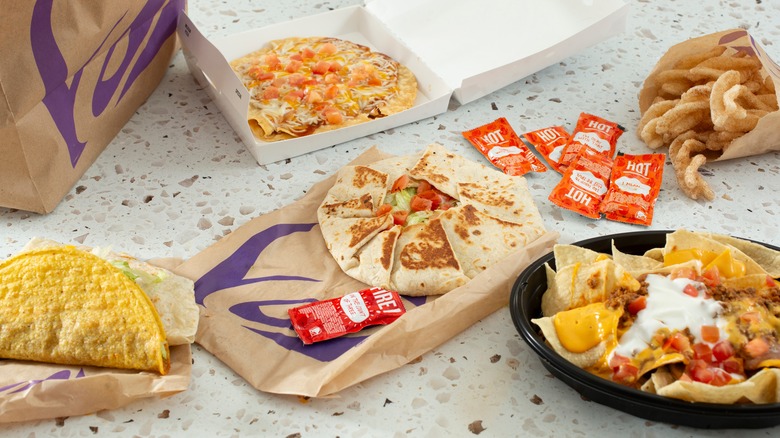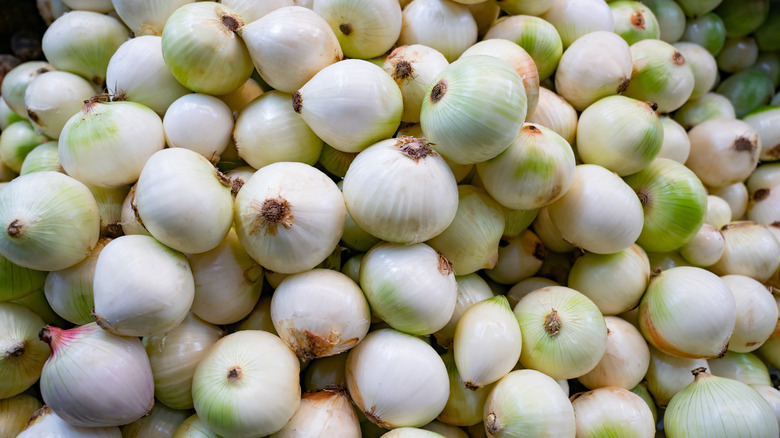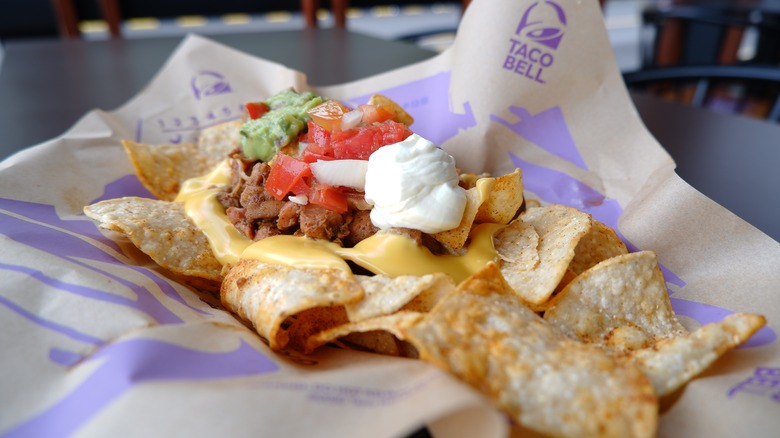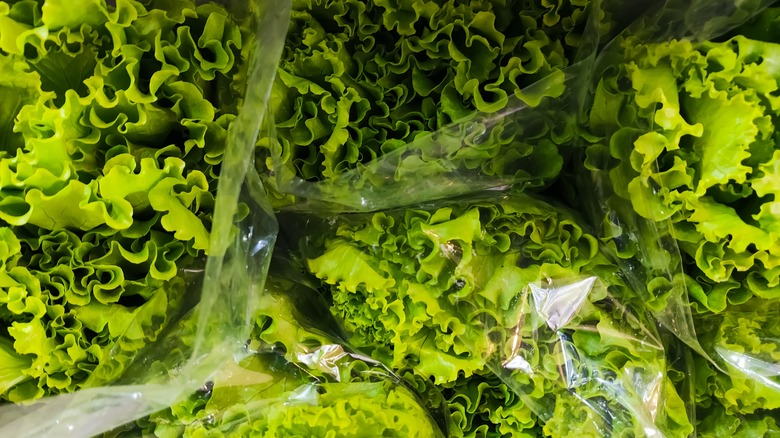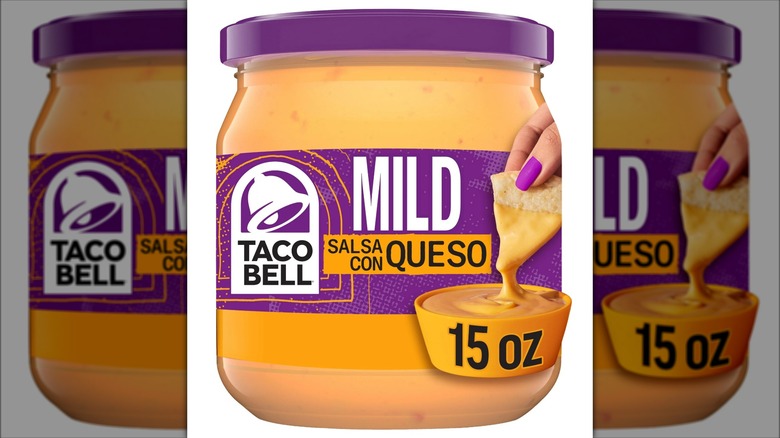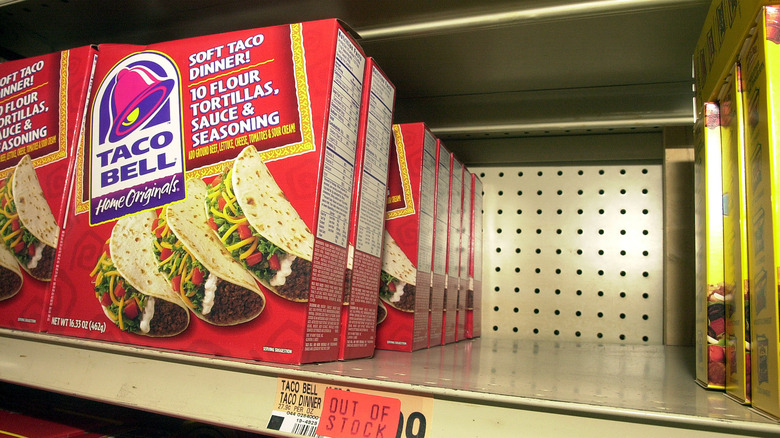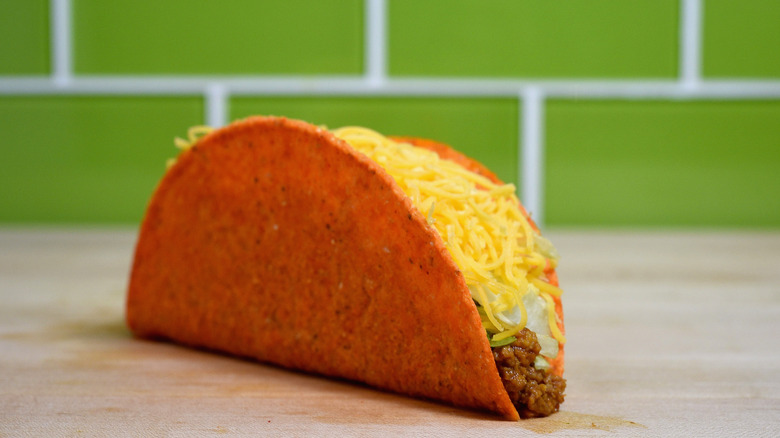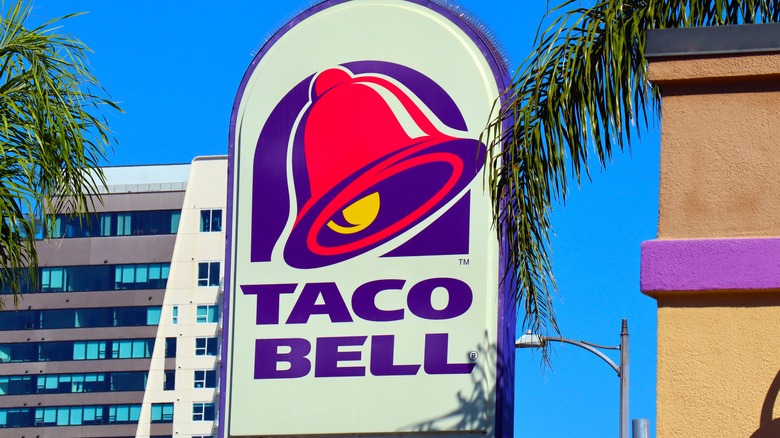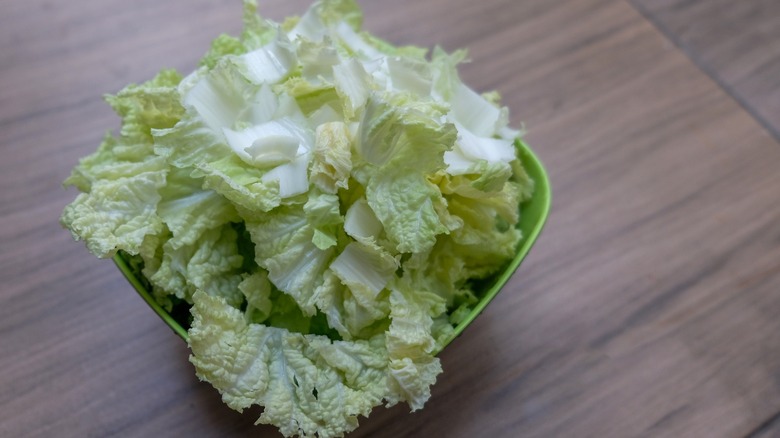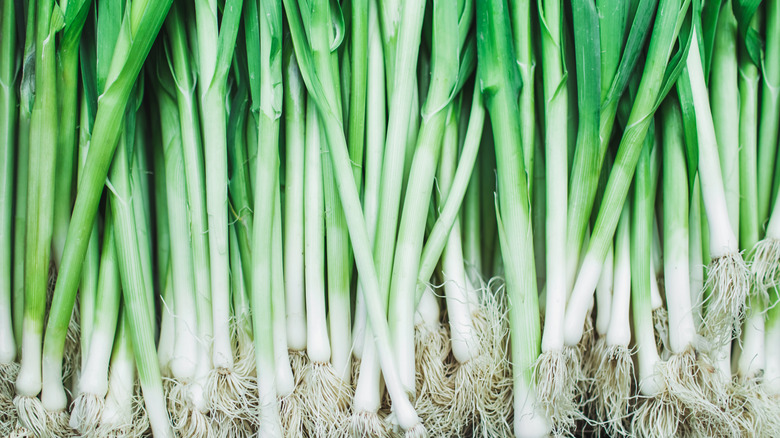9 Food Recalls That Will Always Haunt Taco Bell
We may receive a commission on purchases made from links.
Taco Bell is one of the biggest fast food franchises out there, and it has the menu to show for it. There are dozens of Taco Bell menu items, with firm favorites like the Cheesy Gordita Crunch and its legendary Crunchwraps, and all of these choices require different ingredients to make them. Unfortunately, the more ingredients there are, the more opportunities exist for things to go wrong, and in Taco Bell's history things haven't always been so rosy. The fast food chain has been plagued by some incredibly serious recalls, which have put the lives of its customers at risk and dented the franchise's reputation significantly.
The fresh ingredients used in Taco Bell menu items, like onions and lettuce, have frequently been the cause of these recalls. High-profile cases of bacterial contamination have led to wide scale withdrawals of these ingredients and hasty replacements of suppliers. As items like these are often uncooked and used as toppings, they bear a particular risk of harboring dangerous bacteria that isn't eliminated by sufficient heat. It's not just the veggies that are at fault, though: Taco Bell's beef has been found to be substandard or even risky on several occasions — and was once even found to contain way more than just beef. Horse meat, anyone?
1. A massive E. coli outbreak caused Taco Bell to recall its onions
E. coli is one of the most common contaminants of fresh vegetables, due to their being grown in soil that can be exposed to tainted water or animal feces. Unfortunately, when E. coli takes hold, things can get really bad. This was seen in 2024, when a massive outbreak of E. coli caused by onions led to Yum Brands, the company that operates Taco Bell, pulling the vegetable out of select locations.
To be fair to Taco Bell, though, this one wasn't exactly its fault. The E. coli outbreak was instead linked to another fast food chain, McDonald's, which was identified as the likely source of contamination for the dozens of people that became sick. It appears that the fresh onions that McDonald's placed on its quarter pounder burgers, which were supplied to the restaurant by Taylor Farms, were to blame. Taylor Farms also supplies other fast food franchises like Burger King with some of its onions, and it's clear that the company's reach extends far, which likely frightened Yum Brands into acting swiftly. It was quick to note, however, that it was acting out of excessive caution, while McDonald's was meanwhile dealing with a serious dent in its reputation.
2. Potential metal contamination resulted in a big recall of ground beef
When you're eating a taco from Taco Bell, the only thing you want to be hard is the shell: The rest of it should be soft, pillowy, and utterly moreish. Unfortunately, in 2019 the chain was dealing with the very real issue of people finding ultra-hard, ultra-dangerous metal shavings in their menu items. Three individual customers complained that they found shards of metal inside their food, with the common thread being that all the items contained beef. As a result, Taco Bell and supplier Kenosha Beef International had to start seeking the tainted beef out and recalling it.
This was far from a small job. The companies established that approximately 2 million pounds of beef had been affected by the potential contamination. This beef has also been distributed to no less than 21 states. The good news is that once the issue was identified, things moved incredibly quickly. It took Taco Bell a grand total of six days to remove all of its beef from the stores it had been shipped to. Not bad, huh? The restaurant was also helped reputationally by the fact that nobody had become injured by eating the beef, but it was a close shave. Get it? A close shave? Because of the metal — yeah, you got it. Cool.
3. A 2013 E. coli outbreak caused a recall of Taco Bell lettuce
In yet another instance of fresh vegetables leading to an E. coli outbreak, Taco Bell was forced to take part in a recall of the produce used in its stores in 2013. The outbreak occurred in Canada, specifically in the New Brunswick, Ontario, and Nova Scotia regions. While there were no deaths associated with this specific outbreak, 30 people became sick with one case of hemolytic uremic syndrome, a rare but serious kidney condition that can result in organ failure.
The culprit was soon identified as lettuce grown by the supplier FreshPoint Inc., which sent the produce from its farms in California to Canadian branches of Taco Bell. As such, Yum Brands had to operate a hasty recall of the item. It didn't just have to do that for the taco joint, either, but for KFC, another of its brands.
Thankfully, E. coli outbreaks that stem from lettuce can be fairly self-contained due to the shelf life of the vegetable itself, and once the lettuce in question goes bad then things can die down. This isn't always the case, though, given that E. coli bacteria can survive for a significant amount of time in water and manure. Unless the source is identified, it can continue to taint lettuce and other foods and infect more people.
4. Taco Bell's store-bought dip was recalled due to botulism fears
Taco Bell recalls haven't just impacted your local restaurant. Like many other fast food brands, the chain has a range of sauces, dips, and taco kits that allow you to make a version of your favorite meal at home (we recommend you take home a few extra sachets of its iconic red sauce to really amp things up, though). Unfortunately, these store-bought items can be just as capable of being recalled as the freshly-cooked menu items you get in-store, and in 2018 its Salsa Con Queso Mild Cheese Dip posed a potentially massive risk to customers.
It was discovered that the cheese dip, which normally has a smooth consistency, was separating in certain jars. This led people to worry that the conditions inside them could lead to botulism bacteria growing, which could then cause serious, potentially life-threatening health consequences. Because the bacteria that causes botulism is invisible, it could have been present even if there were no other signs of spoilage. As such, Taco Bell had to track down its jars and recall them, with roughly 7,000 cases being affected in total. Luckily, nobody became ill from eating the dip.
5. In 2000, Taco Bell taco shells were recalled after bioengineered corn was used to make them
Of all the reasons to recall a food item, the presence of bioengineered corn has to be a first. In fact, it was a first when it happened to Taco Bell in 2000. The restaurant was embroiled in a media storm when it was revealed that it was selling taco shells branded under its name that contained StarLink, a type of bioengineered corn that shouldn't have been in its product. The reason? StarLink corn had been developed to contain a pest-repelling protein called Cry9C, which may have been effective at keeping critters away from it, but which wasn't approved for human consumption. Instead, StarLink was only approved for use in animal food.
Naturally, the thought of eating this likely wasn't hugely attractive for some people, and Taco Bell understood how poorly it might be received. While the modified corn was only potentially in the supermarket-sold versions of the company's taco shells, it realized that it also had to be seen to act for its restaurants too, and undertook a full replacement of its taco shells nationwide. The impact of the recall was massive, not least on the franchisees who suffered losses in sales because of reputational damage. This resulted in a massive payout from the company that supplied the affected taco shells to Tricon Global Restaurants Inc., which then stated it would pass the money onto affected restaurant owners.
6. In European Taco Bell locations, its beef was recalled after horse DNA was detected
You know what we want in our beef? Beef. You know what we don't want in our beef? Horse. Those are hardly big asks, but if you were eating in Taco Bells across Britain and Spain in 2013, beef options might have been something you'd like to reconsider ordering. The restaurant was embroiled in a massive scandal that year when it was found that some of its beef contained a surprisingly large amount of horse DNA. This indicated that horse meat had somehow gotten into its ground beef mix, alarming customers in Europe and worldwide and prompting the hasty recall of beef products from its restaurants.
The presence of horse meat in Taco Bell's beef was part of a much wider issue, in which multiple food products across a dozen European countries were found to have been mislabeled and containing horse DNA. Some of the meat was produced in Romania and apparently left the country correctly labelled, before it was apparently changed to be labelled as beef elsewhere. The scandal resulted in intense investigations and widespread fear around beef and meat products, and no doubt dented Taco Bell's reputation across Europe significantly.
7. Potential plastic contamination led to a 2004 recall of Taco Bell beef
Plastic is everywhere we look, including surrounding a lot of our food — but while we might have gotten used to our ingredients coming in plastic, we don't want it inside them. Sadly, plastic getting into food is an all too common occurrence, and in 2004 it was Taco Bell's turn. In the chain's locations across Southern California, customers started to notice that their orders of beef tacos and burritos had a little something extra in them: hard pieces of plastic. When they informed management of the issue, things escalated up the chain of command, and a recall was eventually ordered.
This recall took place around the same time as a beef scare that was connected with mad cow disease, but Taco Bell was quick to assure customers that the two things weren't connected. It seems as though the recall was pretty contained: The issue was only flagged in a pretty small geographical area and, as always, Taco Bell moved quickly to resolve things. It could have been way worse, though. Plastic contamination in food poses a massive choking risk, but thankfully nobody seems to have become injured as a result of it making its way into their orders.
8. In 2006, Taco Bell was involved in a huge E. coli outbreak linked to its lettuce
Another day, another E. coli scare for Taco Bell. The restaurant has had to deal with multiple E. coli outbreaks in its history, which makes its way into its restaurants on fresh produce. One of the earlier spates of food poisoning occurred in 2006. Towards the end of that year, swathes of people started becoming sick with E. coli poisoning, which was eventually linked back to them eating at Taco Bell locations in the Northeast. Officials promptly started investigating which ingredients could be behind the illnesses, with lettuce eventually identified as the culprit.
Taco Bell responded by springing into action. The restaurant embarked on a recall of its products and a hasty switch of lettuce suppliers in a bid to stem the side of illnesses. Taco Bell was keen to state that the issue wasn't coming from in-house, and that its restaurants themselves were clean and sanitary. "This is an ingredient issue. It has nothing to do with the hygiene of our restaurants," stressed Greg Creed, Taco Bell's president, to CNBC. This infamous fast food recall also saw eight people developing the dangerous hemolytic uremic syndrome as a result of their E. coli poisoning, and came at a time when fast food restaurants around the country were dealing with repeated E. coli outbreaks.
9. Green onions were at the center of a massive food poisoning scandal
One of the most remarkable recalls that Taco Bell ever undertook was for an item that wasn't actually to blame. Back in 2006, the chain was in the grips of dealing with an E. coli scare that was later identified as being caused by its lettuce. However, on the way to discovering this, it worked through all of the potential sources of the food poisoning — and in a very high-profile fashion, it landed on its green onions. Taco Bell publicly withdrew green onions from all of its 5,800 restaurants, while also stating that they may have been to blame for people becoming sick. The recall of its green onions received widespread coverage, so much so that when the eventual culprit was identified as lettuce, it kinda seemed like an afterthought.
The green onions were soon cleared as safe, and you might expect Taco Bell to put them back in its stores at that point. Alas, it was not to be. Taco Bell decided to make the withdrawal of its green onions permanent, and while it may be known for bringing back its fan favorites, it seems that its onions aren't gonna make an appearance any time soon. We can't help but think that Taco Bell was just using the opportunity to take them out of stores, to be honest.
